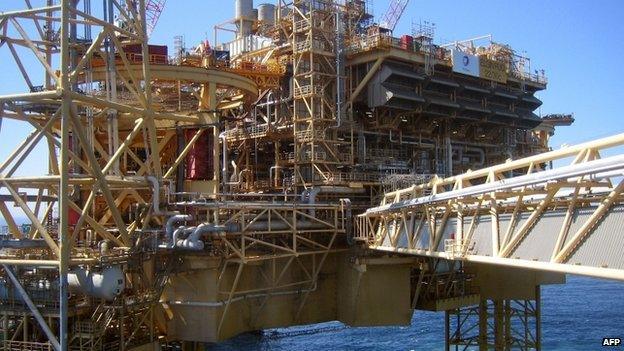Oil and gas industry leaders call for more tax cuts as oil prices plummet
- Published

Oil and gas industry leaders have called for taxes to be cut further to help the sector deal with falling oil prices.
Industry body Oil and Gas UK said special taxes, particularly the supplementary charge, should be scrapped.
Political leaders and industry figures had earlier held talks in London.
The price of Brent Crude dropped to $45 in early trading on Tuesday, its lowest level since early 2009.
A meeting was held of PILOT, formerly the Oil and Gas Taskforce, which facilitates the partnership between the UK oil and gas industry, and government.
Afterwards Malcolm Webb, chief executive of Oil and Gas UK, said: "With so much existing and future production and associated jobs and tax revenues at risk, we conveyed the urgency with which fiscal and regulatory change is required, alongside industry efforts to tackle costs and improve efficiency.
"With oil prices now well below $50, Oil & Gas UK believes that the rationale for the abolition of special taxes, particularly the supplementary charge, is compelling.
"It also sees it as crucial that the newly-formed Oil and Gas Authority is rapidly resourced so that it is well-placed to perform robust stewardship of the sector."
Scottish Secretary Alistair Carmichael said it had been a "good and constructive meeting where everyone round the table had their say and described with some clarity the challenges now facing the North Sea oil and gas sector".
He added: "Today's meeting shows the value of the industry and governments working together in good faith, with the best interests of the sector the sole focus of everything we do.
"Both the UK and Scottish Governments have a range of powers they can use to help oil and gas companies, as well as those in the supply chain, and we should all be pulling together to help the industry weather the current storm."
'Cash cow'
But speaking ahead of the meeting, Scotland's Energy Minister Fergus Ewing accused the UK government of "mismanagement".
"The oil and gas industry is a strong success story for Scotland", but there is a need to "tackle the ongoing cost pressures and the fall in oil prices head on," he said.
The Scottish government has proposed three main changes to the oil and gas fiscal regime, as detailed in their latest Oil and Gas Discussion Paper:
An investment allowance to provide support for fields that incur higher costs to develop
A reversal of the increase in the supplementary charge introduced by the UK Government in 2011
An exploration tax credit to help increase levels of exploration and sustain future production.
Mr Ewing said: "I am confident that our proposed fiscal changes will not only boost the economy but analysis based on industry data shows that they will support thousands of jobs.
"After years of using the North Sea as a cash cow the UK Government must finally and urgently take substantive action.
"We believe there is a long-term sustainable future for the North Sea and we are committed to using every lever at our disposal. It is time for the UK government to follow suit."
Mr Carmichael insisted the UK government was supporting the industry through the package of allowances and tax reliefs as part of the Autumn Statement and the on-going implementation of the Wood Review.
The price of a barrel of the North Sea benchmark dropped to $45 in early trading on Tuesday, its lowest level since early 2009.